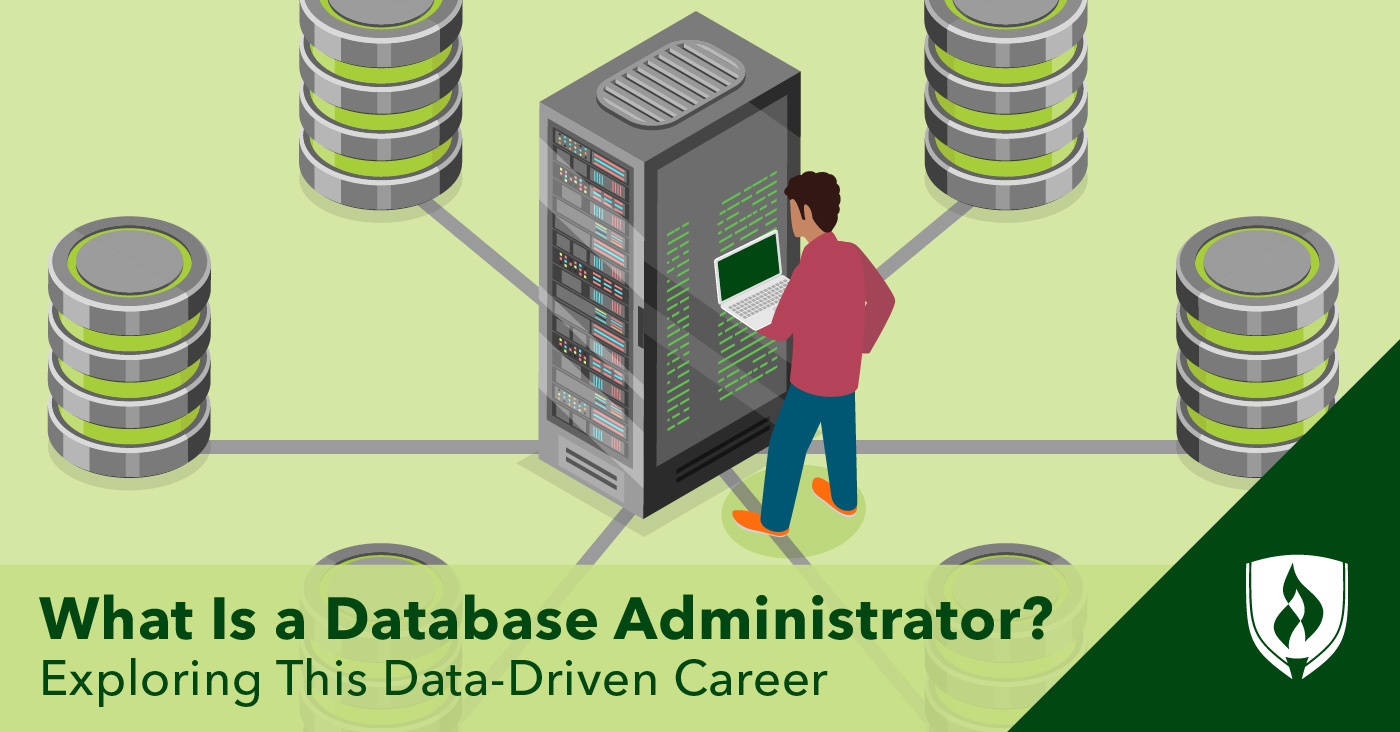
The U.S. News & World Report® recently listed database administrator (DBA) as a top-seven role in their ranking of America’s best technology jobs—and for good reason!1 The combined career outlook, earning potential and education path makes this role seem like it could be an appealing option for your future. But what exactly is a database administrator? And what does a database administrator do?
If you have a natural talent for inductive reasoning, critical thinking and analyzing data, keep reading. In this article, you’ll learn more about the day-to-day duties of a database administrator, their typical work environments, relevant skills needed, salary information and what it takes to become a database administrator.
What does a database administrator do?
Database administrators build, organize, protect and maintain systems that store data. In today’s increasingly data-hungry landscape, DBAs are more important than ever. They work to make data accessible, secure and sorted into systems people can use to glean information and make decisions.
“My job is to ensure that [my company’s] data is available and accessible when their information needs to be pulled or updated by an application,” says Lisa Smith, senior remote database administrator at MariaDB Corporation. “I also make sure that their data remains secured and backed up, so it isn’t lost.” Databases tend to contain a lot of valuable or sensitive personal information, so DBAs administer security controls to control access and test for potential vulnerabilities.
Beyond security controls, they also play an important role in creating back-ups and other failsafe measures to get things back up and running in the event of a failure or outage.
It also takes a lot of potential computing power to work with data on the scale many organizations use, so database administrators work at creating databases that operate as efficiently as possible. This can include testing potential modifications to existing databases in order to improve efficiency.
What is the biggest challenge of being a database administrator?
Information stored in a database can be used for a variety of reasons by different programs and platforms—and trying to make it all work harmoniously can be tricky. DBAs set up new databases to fit an organization’s needs—for example, creating a database to store customer payment and shipping information. And they need to ensure it connects and “plays nice” with other systems that rely on this data.
To achieve that, DBAs must pay careful attention to how databases are organized and structured on both ends to ensure nothing gets lost in the translation. “On a day-to-day basis, you will likely run into a new software bug or encounter something you’ve never seen before,” Smith says. “The hallmark to being a successful DBA is to remain curious and fearless.”
Where do database administrators work?
Given that databases aren’t exactly a storefront enterprise, it can be hard to picture exactly where you’ll be working. DBAs work for practically any organization that uses databases, and these days, databases are practically everywhere.
Your favorite upstart social media platform needs a database to house your profile. The company you buy custom phone cases from needs a database to track shipping information. The Bureau of Labor Statistics (BLS) reports industries that employ the most database administrators and architects are:2
- Computer systems design and related services
- Educational services; state, local and private
- Management of companies and enterprises
- Insurance carriers and related activities
- Data processing, hosting and related services
Depending on the employer, database administrators do have the ability to work on-site or remotely. “I keep MariaDB databases all over the world running and optimized—all while being fortunate enough to work from home,” Smith says.
What skills do database administrators need?
We used real-time job analysis software to analyze 95,467 database administrator job postings from the past year. The data revealed the top technical and soft (transferable) skills employers are seeking right now. Here is what we found:
Technical skills in demand3
- SQL
- Teradata® DBA
- Oracle®
- SQL Server
- Extraction transformation and loading (ETL)
- Performance tuning
- Data warehousing
- Python®
- Linux®
DBAs need to have a holistic view of the information they’re organizing, as well as a meticulous lens for errors and misplaced data. They must also put complex problem solving and critical thinking into action to make decisions that will benefit the database and company.
Transferable skills in demand3
- Communication
- Troubleshooting
- Problem solving
- Teamwork
- Planning
- Writing
- Detail-oriented skills
- Microsoft Excel®
- Research
- Organizational skills
To work as a database administrator, you’ll need an interesting blend of technical database and programming skills, along with people skills. Oftentimes, DBAs will assist staff members with issues, so you need to be able to communicate your answers effectively. Similar to other technical jobs, you’ll often need to translate technical jargon into layman’s terms.
What is the career outlook for database administrators?
It’s a good time to be working in a data-related field, and that certainly rings true for database administrators when it comes to employment growth. DBA positions are projected to increase at a rate of eight percent from2020 to 2030, according to the BLS.2
How do you become a database administrator?
As you might expect with a career that focuses so much on technical knowledge, you’re going to need a college degree to become a database administrator. The BLS lists that most DBAs have a Bachelor’s degree in a technology field. Degree programs like Information Technology Management, Data Analytics or Computer Science can all provide a solid foundation to base a database administration career on.
There are also a variety of certifications that DBAs can earn to boost their resume. Some of the most common are Oracle database certifications, and Microsoft Azure® database certifications. Keep in mind, a degree and certifications will certainly put you on your way toward working as a DBA, but employers may prefer candidates with experience in a related lower-level IT role.
With or without certifications, Smith emphasizes that the learning never stops. “You have to be resilient and flexible. Things are always changing, and we’re always finding new solutions to improve our customers’ lives and ensure the database is running optimally.”
Think big picture
There are a lot of different tech jobs out there. But if you don’t want just any job in technology, rather a career with a blend of hard skills and human interaction and a clear purpose to protect what may be the world’s most valuable resource—data—it’s certainly worth considering a career in database administration. The projected growth, earning potential and current demand make it an exciting opportunity.
One of the few things standing between you and this budding career is the technical training and knowledge that comes with a formal education. Check out the Data Analytics degree page to learn how this program can help prepare you for a variety of data-focused IT careers.
1U.S. News & World Report, Best Jobs 2019, Best Technology Jobs, [accessed February 2022] https://money.usnews.com/careers/best-jobs/rankings/best-technology-jobs
2Bureau of Labor Statistics, U.S. Department of Labor, Occupational Outlook Handbook, [accessed January 2022] www.bls.gov/ooh/. Information represents national, averaged data for the occupations listed and includes workers at all levels of education and experience. This data does not represent starting salaries. Employment conditions in your area may vary.
3Burning-Glass.com (analysis of 95,467 database administrator job postings, Jan. 01, 2021 - Dec. 31, 2021).
U.S. News & World Report is a registered trademark of U.S. News & World Report, Inc.
Teradata is a registered trademark of Teradata US, Inc.
Oracle is a registered trademark of Oracle Corporation.
Python is a registered trademark of The Python Software Foundation.
Linux is a registered trademark of Linus Torvalds in the U.S. and other countries.
Microsoft Excel and Azure are registered trademarks of Microsoft Corporation.
EDITOR’S NOTE: This article was originally published in 2017. It has since been updated to include information relevant to 2022.




